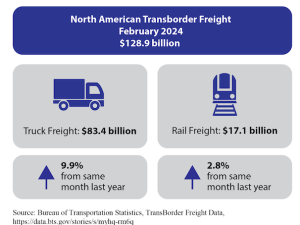Hitachi Eyes U.S. Rail Growth Amid Seismic Political Change
By: | Mar 10 2017 at 07:00 AM | Intermodal
Hitachi Ltd. is aiming to expand its rail business in the U.S. by bidding for streetcar and light-rail projects as President Donald Trump pledges to spend as much as $1 trillion to upgrade infrastructure across the country.
The Japanese conglomerate “sees quite a big opportunity” in the U.S., Alistair Dormer, chief executive officer of Hitachi Rail Europe Ltd., said in an interview in Tokyo Thursday.
“When there’s a political change, perhaps as seismic as happened at the moment, I think everyone pauses and says, what is going to happen?” Dormer said in Tokyo. “One has to look at what will be the Buy America policy going forward and then we need to decide the right strategy.”
The Tokyo-based maker of bullet trains is aiming to more than double its rail sales in the coming years as it expands globally with a shrinking population at home. The U.S. may be one key to Hitachi’s strategy after Trump bemoaned the slow progress in modernizing the country’s highways, bridges, tunnels, airports and rail, and campaigned for better facilities to ensure the nation can export its goods and move people faster.
The American Society of Civil Engineers, in a report Thursday, assigned a grade of “D+” to the quality of infrastructure and said an additional $2 trillion in funding is needed to raise the standards.
In the closely watched assessment that the ASCE publishes every four years, the group estimated there’s a gap of more than $2 trillion between projected current funding and the $4.59 trillion it would take to improve U.S. infrastructure to a “B” grade by 2025.
The civil engineers group defined the “D+’’ grade as infrastructure that is “in fair to poor condition and mostly below standard, with many elements approaching the end of their service life.”
“There are a number of municipalities or cities that have got investments for either metro rail or light rail, so we’re bidding for Baltimore and we’re analyzing a number of other opportunities,” Hitachi’s Dormer said.
The company opened a train manufacturing plant in Miami last year and a factory in County Durham in the U.K. in 2015 after securing contracts in both countries.
Hitachi Rail USA will build 136 cars at the Miami factory to replace Miami-Dade County’s Metrorail fleet and the first new vehicles are scheduled go into service later this year. The company’s line-up of factories and its order book increased after it bought the rail business of Italy’s Finmeccanica SpA and a stake in a signals affiliate in 2015.
Hitachi shares declined 0.3 percent to 630 yen at the close of trading in Tokyo Friday. They have gained 22 percent in the past year, compared with a 16 percent increase in the Nikkei 225 Stock Average.
U.K. Contracts
Hitachi has also won orders for over 1,600 trains in the U.K., including a contract to supply more than 860 intercity train cars, which will keep its factory there busy until at least 2020, Dormer said. The U.K. factory has about 1,200 workers and the company will boost that to 2,000 by 2019, he said.
Britain’s vote to quit the European Union has created uncertainty for Hitachi should it target exports in the future and there are tariffs or barriers, Dormer said.
“Clearly, when the government has been putting out a position against Europe in favor of the U.K., it would be quite embarrassing if they then bought a huge number of trains from Europe and our factory in the U.K. was empty,” he said. “We’ve worked very hard to position Hitachi as a British company in the U.K. in rail.”
The company plans to apply for pre-qualification to build trains and signals for HS2, U.K.’s second high-speed train link, later this year, followed by a bid next year, Dormer said. It has also tied up with Bombardier Inc. to compete for a 3,000-car London Underground contract against Alstom SA and Siemens AG, he added.
“Under the leadership of Dormer, Hitachi’s rail business has done well,” said Yukihiko Shimada, an analyst at SMBC Nikko Securities Inc. “There’s no need to be negative about Brexit with the focus on the U.K.”








